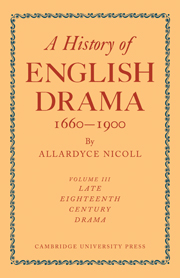Chapter Three - COMEDY
Published online by Cambridge University Press: 05 March 2012
Summary
The Main Types
In the preceding chapter we have seen how the serious drama completely broke down in the late eighteenth century. The literary men for the most part clung to the outworn ideals of pseudo-classicism, but pseudo-classicism had long ago passed by its era of vitality and had become a mere fetish; it had, moreover, but a scanty following in the auditorium of the theatre. A few men, certainly, endeavoured to bring true romanticism into the playhouse, but their efforts were both sporadic and amateurish. Others, too, appealed to the audiences, but they did so through the more blatant and artistically vulgar medium of the melodrama.
When we study the repertoires of these years, therefore, it is not surprising to find that tragedy rapidly loses the position it held in the first half of the century. As season passes season we can see the nightly performances growing more heterogeneous and absurd. Farces, pantomimes, short melodramas, comic operas fill up the majority of the playbills; if a tragedy or a finer comedy is acted, it is accompanied by a mass of other less dignified attractions. At the same time a certain section of the audience at least called for more serious works of dramatic art, obtaining the revival of many of the best among the older plays. Shakespeare is well represented, not only with Henry IV and The Merry Wives of Windsor, but with the romantic comedies as well.
- Type
- Chapter
- Information
- A History of English Drama 1660-1900 , pp. 108 - 190Publisher: Cambridge University PressPrint publication year: 1952



